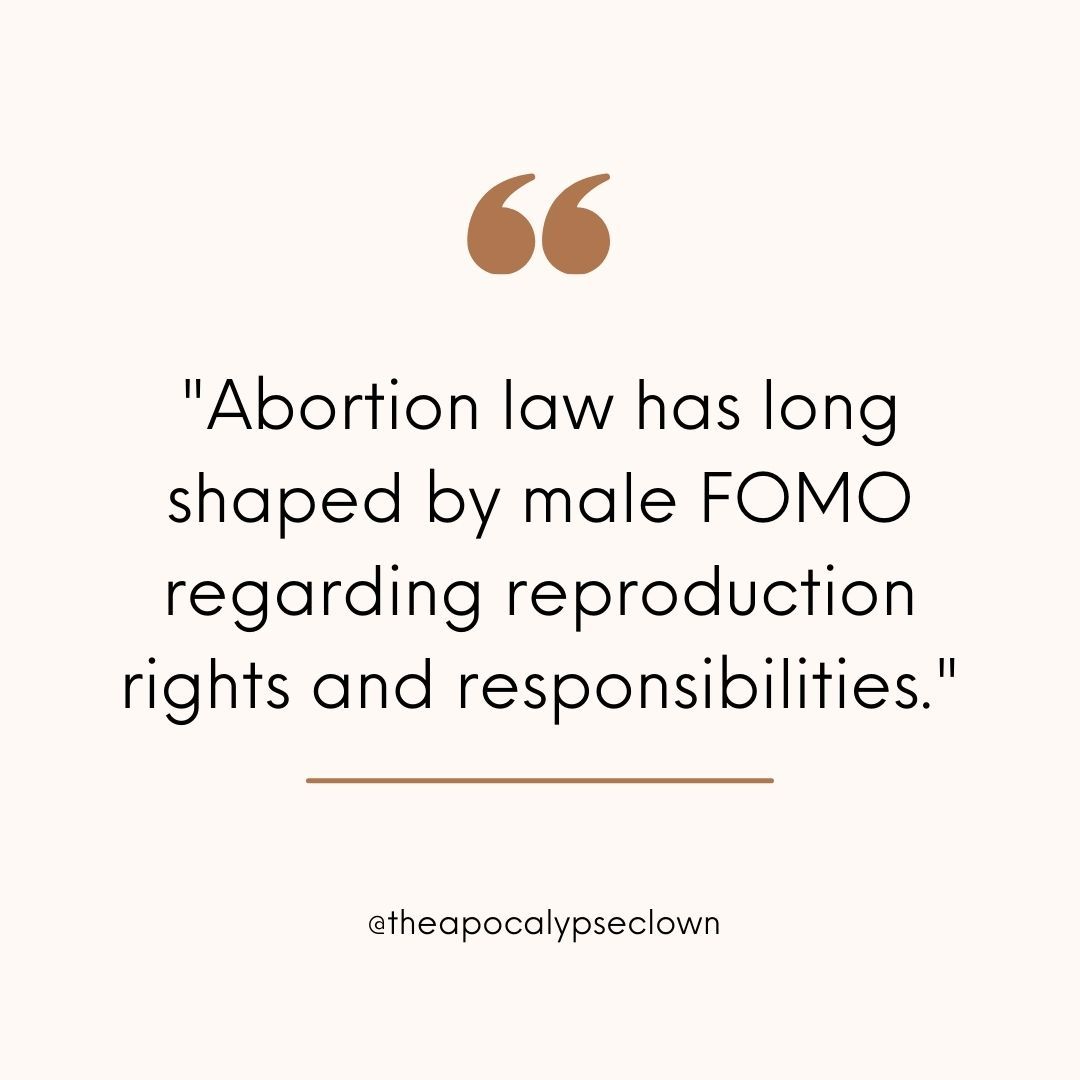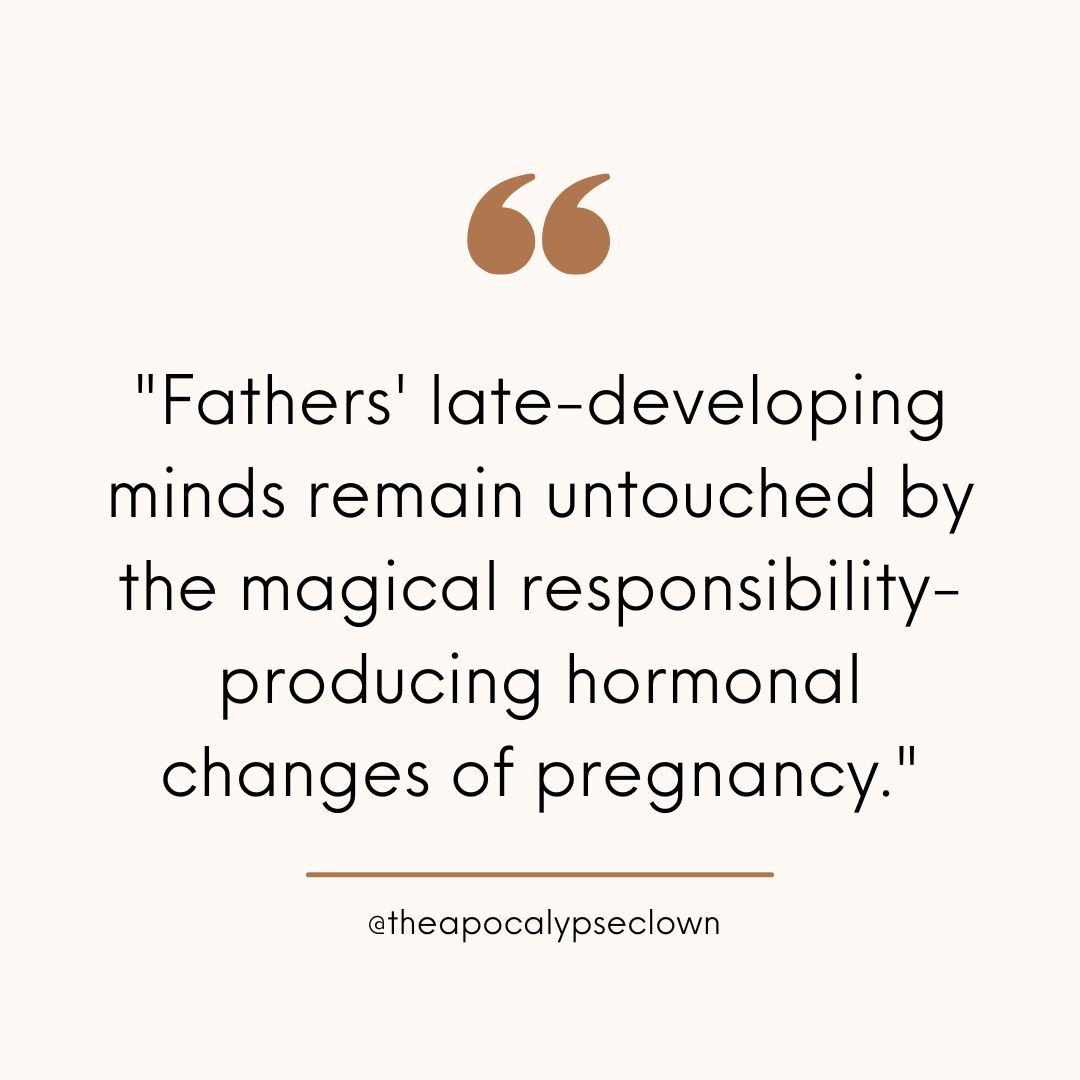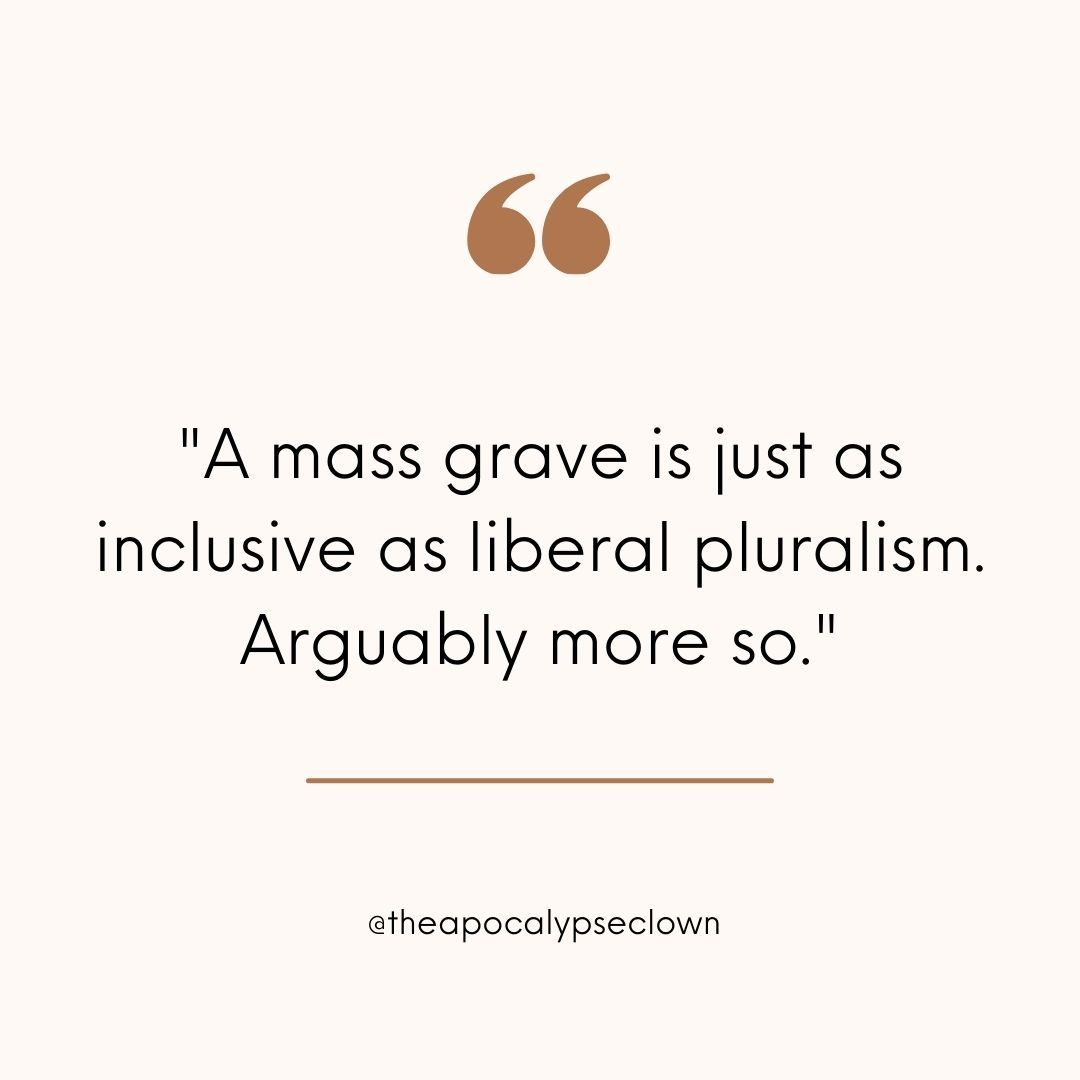A Modest Proposal

Family Law for A Post-Roe World
With the overturn of Roe V. Wade, more fetuses will be blossoming into babies and it’s time to consider how this should be reflected in American family law. Obviously, the next natural step is to roll back more civil rights in the name of family values, but which to take away first? I believe I have the answer.
I think it's high time we finally addressed the undeniable fact that fathers do not have the same biological capacity for responsibility as hosts do and, therefore, legislating fathers into responsibility is against nature. Instead, we need a system that places responsibility where nature does – with the hosts.
My proposal is inspired by Oklahoma lawmaker Justin Humphrey's 2017 bill requiring that women have written consent from the father to get an abortion. “I believe one of the breakdowns in our society,” he said at the time, “is that we have excluded the man out of all of these types of decisions…. The thing I want to spark in a debate is that fathers have a role. Exactly where that role is, I’m not sure.”
Objectively speaking, the father certainly does have a role in the life of the child. Fathers do exist and are related to their children. However the role of the father is, as Humphrey points out, a bit unclear because the only the mother is physically responsible for gestating the infant and, in broader sense, if we are honest, who among us has not asked themselves, in a moment of frustration or hushed reflection, "what is the point of men?"
I am, of course, speaking in purely scientific terms. I am a biological realist and, as such, I believe that men and women are different in irrefutable ways. With his delicate uncertainty, Humphrey's has perfectly summed up one of those differences. The father, not being pregnant, maintains a physical separation from the fetus and therefore it’s hard to know what he is really for.
Up until now this difference has only been partially accounted for in the public conversation about abortion. It is why abortion has been so often treated as a women's rights issue. Pro-choicers would have us believe that abortion bans are somehow about "controlling women," rather than simply about doing what is best for fetuses and families. The conversation about abortion and family law has tended to get stuck on this point, but it's time to move forward towards all-compassing family law that actually accounts for the inherent inequity of responsibility that pregnancy involves.

Humphrey nicely set the stage for this move when he coined the term "host" to refer to pregnant people. “I understand that they feel like that is their body,” he said of women, “but… what I call them is… you’re a ‘host.’” At the time some people found this offensive but I like the term [1] because it brings the special responsibilities inherent in pregnancy to the forefront of the conversation.
Here's the truth about pregnancy: the host is physically responsible for growing the infant in her body, fathers are not. [2] While they are equally responsible for the fetus in the sense of being “to blame for its existence,” the father and the mother do not bear equal responsibility for the development and gestation of the fetus. Essentially,f athers have responsibility for their offspring, but they are not responsible.
It is a biological fact that every host is capable of taking on dependents. By becoming pregnant, the host proves that she has an inborn capacity for responsibility. Nature would not make sense otherwise and neither would the pro-life movement. The truth is, girls mature faster than boys and are natural nurturers. Hosts, in short, are biologically built to care for others. Once the body is mature enough to get pregnant, the host is mature enough to be responsible for their own choices as well as for the lives of others.
Regardless of how progressives may attempt to manipulate concepts of “childhood” and “bodily autonomy,” the ways a host is physically and chemically transformed by pregnancy are irrefutable. It’s highly possible, maybe even probable that the hormonal changes involved in pregnancy actually produce the capacity to be responsible for others, even when the host was, prior to insemination, not at that level of development whatsoever. For example, a twelve year old who becomes pregnant may be still a child in many ways, but her body is clearly mature enough to undergo the labour of producing and nurturing another person, and since we know she should be forced to bear that child, it’s clearly reasonable to extend the host's legal responsibility to the fathers of their children.
As they say, boys will be boys. Fathers are easily distracted and their late-developing minds remain untouched by the magical responsibility-producing hormonal changes of pregnancy. Yet we continue to make the mistake of thinking that maybe they can be and we have so far failed to establish a legal framework that takes this into account.
The Proposal
In order to rectify this oversight, I propose that for two years following the birth of a child, no personal life choices may be enacted by the father without the written informed consent of the host. This would include but is not limited to bank loans, changes in address, job applications, changes in employment or salary, gym memberships, airfare purchases, and it’s probably best to require a signature on the tax returns as well.
The inspiration for this solution was once more, drawn from Humphrey. He is the visionary who gave me the idea that the father's primordial separation from their child might be healed by a system of permission notes. And why not? Permission notes worked in high school and they can work in family law too. His only mistake was thinking father should be the one giving permission.
It is a biological fact that every host is capable of taking on dependents. By becoming pregnant, the host proves that she has an inborn capacity for responsibility. Nature would not make sense otherwise and neither would the pro-life movement. The truth is, girls mature faster than boys and are natural nurturers. Hosts, in short, are biologically built to care for others. Once the body is mature enough to get pregnant, the host is mature enough to be responsible for their own choices as well as for the lives of others.

Logistics
When I first started to play with the idea of a permission system, I enjoyed the idea of hosts keeping little notebooks on hand at all time where they could write out notes like “The father of my child may attend this conference” or “I permit him to sign up for a gym membership. Please no tanning beds.” I envisioned a digital database all permission notes are kept in. But then I started to wonder who would be checking all these notes. It began to seem unwieldy. Luckily, nothing is new on Heaven and Earth. There is already a system designed for exactly this purpose.
This system came to my attention via the inspiring case of Britney Spears. Her conservatorship has, over the past few years very publicly raised conversations about what makes someone capable of making their own legal, financial, and personal decisions. Britney lived under the legal control of her father for years, while continuing to work and perform. It seemed to many people that, if she was capable of performing her job at such a high level she must also be capable of directing her own life. However, in spite of her apparent capacities the courts upheld her conservatorship for years. Clearly, this is a valuable precedent that can help us put families first.
So, I humbly propose that Congress implement a temporary conservatorship system where legal and financial decisions are made for the father by the host for a specified term from the time a baby is conceived. I’ve suggested two years, but I can already hear the the outcry: “Two years is too short! A child doesn’t start school until 4 years old. They need near-constant supervision until at least 8. They are not legally independent until they are 18 and these days many are financially dependent well into adulthood!” Indeed these are all valid points. Conceiving, bearing and raising children is a lifelong commitment. Certainly anything up to eighteen years might be reasonable as a term. Two years may not enough, but at least it’s a start towards our family-values aim of privileging the well-being of the child over the autonomy and self-determination of adult persons.
Overcoming Objections
Now, I realize that it might look funny when you first see a young woman serving as the legal guardian of the 30 year old who raped her, but cultural norms have always shifted to meet changing times. The fact is that dating and marriage landscapes have changed dramatically in the years since Roe was codified in 1973. Our work is to face the new reality while honouring the natural order. Just as the coat hanger will not be the symbol of illegal abortion in the post-Roe era because abortion pills and other medical advances have changed the landscape, the shotgun wedding will not be the go-to response to unplanned pregnancy. If we can get used to swiping right and left to meet people, we can get used to this.
Final Thoughts
Until now, the pro-life movement has not gotten too much further than shutting down the absurd idea that hosts should have bodily autonomy because they are somehow responsible enough to kill a baby but not responsible enough to have a baby. However, we have not followed the logic through to its reasonable conclusions. Fathers simply don’t have same level of natural involvement in child-bearing that develops responsibility as hosts do, and the lack of clarity around their role means it must be clarified by the legal system.
Previously, strong social norms encouraging marriage served this purpose, but as society has moved on, family law now tends to focus on ensuring financial support for the child. Unfortunately this is a fundamentally unrealistic approach because legislating fathers into responsibility is clearly against nature.
Abortion law has long shaped by male FOMO regarding reproductive rights and responsibilities. This law would finally acknowledge men’s crucial role in reproduction in a way that truly accepts and honour them in the way nature intended: as relevant, but irresponsible and only vaguely involved entities.
What better way to honour the inborn capacities of fathers and hosts in one fell swoop? I have no doubt that we can all get behind a law that so beautifully reflects the truth about the responsibilities inherent in having sex and babies, while, just a elegantly reflecting our pro-life interest in promoting family values over personal autonomy

I do want to be clear that, while I realize that the term “host” has the side effect de-gendering the terminology for the mother, I do not want to be misunderstood as "concerned with inclusivity” or some such thing. It’s just that, sometimes, when you erase all features of personal identity from people, you accidentally get there. After all, a mass grave is just as inclusive as liberal pluralism. Arguably more so. But, this is not the focus of my argument. I am far more interested in what science tells us about reproductive responsibility. ↩︎
Of course, it’s a bit curious that Humphreys neglected to update his terminology for the father, leaving us, with a somewhat confusing, if vaguely familiar family structure consisting of a father, a host, and a sacred fetus. I believe that Humphrey chose not to update the term father because, as he so aptly pointed out, the father’s relationship to the sacred fetus is so fundamentally unclear. ↩︎



Comments ()